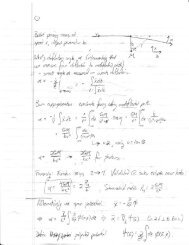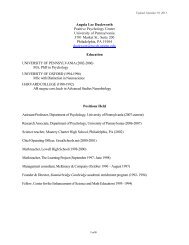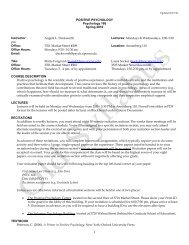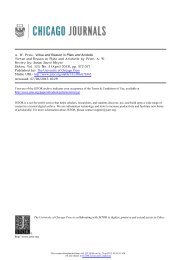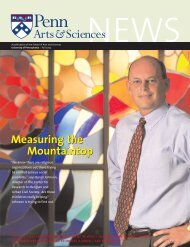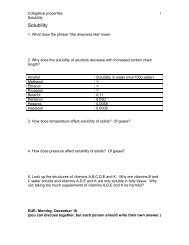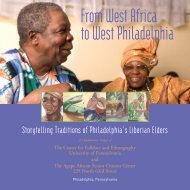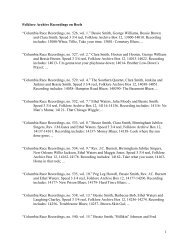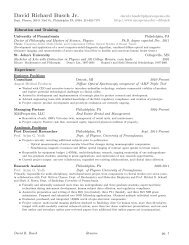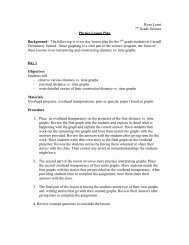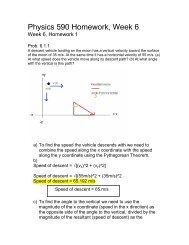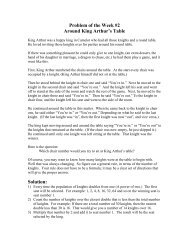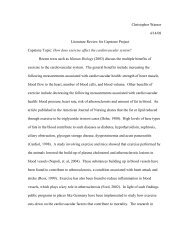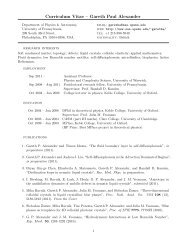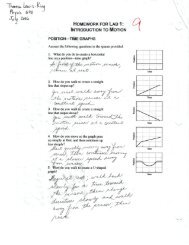David Ludden An account of my work - University of Pennsylvania
David Ludden An account of my work - University of Pennsylvania
David Ludden An account of my work - University of Pennsylvania
Create successful ePaper yourself
Turn your PDF publications into a flip-book with our unique Google optimized e-Paper software.
27-Oct-06<br />
<strong>David</strong> <strong>Ludden</strong><br />
<strong>An</strong> <strong>account</strong> <strong>of</strong> <strong>my</strong> <strong>work</strong><br />
(citations as on appended chronological list <strong>of</strong> publications)<br />
My research concerns local, regional, and national articulations with world economic<br />
history in South Asia since 1750. Focusing first and foremost on local documents, social<br />
experience, physical environments, living conditions, economic activity, and power relations, I<br />
<strong>work</strong> outward from these to explore spaces that connect, encompass, and shape them. By<br />
following various strands <strong>of</strong> history over various spans <strong>of</strong> space and time, I explore dynamics <strong>of</strong><br />
change operating at various spatial and temporal scales. I have developed useful ideas about the<br />
interplay <strong>of</strong> mobility and territoriality that challenge the conceptual foundation <strong>of</strong> history’s<br />
conventional boundaries. My <strong>work</strong> concentrates on economic systems, agriculture, empire,<br />
nationality, urbanism, and globalization. I strive most <strong>of</strong> all to provide useable histories to<br />
engage academic and public debates in South Asia. 1 In addition, I address audiences worldwide<br />
concerned with area studies, 2 South Asia, and US empire.<br />
My <strong>work</strong> began in 1968 when I was a twenty-year old college student public health intern<br />
following tracks <strong>of</strong> empire into a poor village then near Chennai (a.k.a. Madras) – and now<br />
engulfed by it -- the capital <strong>of</strong> Tamil Nadu in south India. There I learned that poverty was the<br />
major health problem, but more importantly at the time, I learned Tamil. I turned <strong>my</strong> mined to<br />
language studies and translation, first <strong>of</strong> revolutionary nationalist verse and then ancient poetry,<br />
where I engaged linguistic and literary registers through which personal experience enters<br />
historic documentation. I would use Tamil texts in <strong>my</strong> <strong>work</strong> for the next three decades to read<br />
inscriptions, memoirs, court records, and local histories.<br />
1973. "The Poems and Revolution <strong>of</strong> Bharathiyar." In Imperialism and Revolution in<br />
South Asia. Edited by Kathleen Gough and Hari Sharma. Monthly Review Press,<br />
New York, pp.267-90.<br />
1976. The Kuruntokai: <strong>An</strong> <strong>An</strong>thology <strong>of</strong> Classical Tamil Love Poetry in Translation<br />
(with M.Shanmugam Pillai), Koodal Publishers, Madurai, 1976.<br />
For <strong>my</strong> doctoral dissertation, I studied agrarian localities in the Tirunelveli region in<br />
southern Tamil Nadu, where I explored the political econo<strong>my</strong> <strong>of</strong> agriculture in its local forms<br />
from the tenth to the twentieth century. Using local records produced under a series <strong>of</strong> state<br />
regimes -- the most detailed being English-language District Records <strong>of</strong> British India, circa<br />
1805-1860 -- I described local entanglements with all these regimes, which determined the<br />
precise impact <strong>of</strong> each regime on everyday agrarian life.<br />
My most influential early contribution came with <strong>my</strong> demonstration that different kinds <strong>of</strong><br />
localities emerged in small, ecologically and demographically distinct agrarian regions, each<br />
integrated variously into wider regimes <strong>of</strong> power and net<strong>work</strong>s <strong>of</strong> interaction. In each small<br />
1 Recent examples are 2005d in Economic and Political Weekly and 2005e in HIMALSouthAsia: see respectively<br />
http://www.epw.org.in/showArticles.php?root=2005&leaf=09&filename=9106&filetype=htmland 2005, and<br />
http://www.himalmag.com/.<br />
2 My website is one venue for this pursuit. For example, 2002b and 2003f appeared first on <strong>my</strong> website, where<br />
editors found them for inclusion in one journal and one edited volume. Many <strong>of</strong> <strong>my</strong> essays appear in various forms<br />
in various media, as indicated on the CV.
27-Oct-06<br />
region, locals determined the on-the-ground impact <strong>of</strong> regimes whose elites had been previously<br />
thought by scholars to be totally domineering, determining local trends entirely. This discovery<br />
had serious implications for the history <strong>of</strong> peasant societies, pre-modern states, imperialism,<br />
capitalism, economic development, and globalization, which I have pursued ever since.<br />
1978a. "Ecological Zones and the Cultural Econo<strong>my</strong> <strong>of</strong> Irrigation in Southern Tamil<br />
Nadu," South Asia, I (NS), 1, 1-13.<br />
1978b. "Who Really Ruled Madras Presidency?" Indian Economic and Social<br />
History Review, 15, 4, 517-21.<br />
1984. "Productive Power in Agriculture: A Survey <strong>of</strong> Work on the Local History <strong>of</strong><br />
British India." In Agrarian Power and Agricultural Productivity in South Asia.<br />
Edited by Meghnad Desai, Susanne H. Rudolph, and A. Rudra, <strong>University</strong> <strong>of</strong><br />
California Press, Berkeley, pp.51-99.<br />
1985b. "The Terms <strong>of</strong> Ryotwari: Semantics and Disputes over Property Rights in<br />
Madras Presidency, 1800-1885." In South Indian Studies: <strong>An</strong> <strong>An</strong>thology <strong>of</strong><br />
Critical Essays and Recent Scholarship. Edited by R.E. Frykenberg and<br />
Pauline Kolenda. New Era Publishers, Madras. pp.151-170.<br />
1985c. "Toward Peasant History: Focus on South India," Peasant Studies, 12, 2,<br />
129-37.<br />
The book that came from <strong>my</strong> dissertation has now been in print for twenty-five years and<br />
remains (sadly) the only one to explore agrarian histories in sufficient local detail over a span <strong>of</strong><br />
time sufficient to locate modern agrarian transformations in the fulsome complexity <strong>of</strong> old, welldocumented,<br />
historically dynamic agrarian political economies in southern Asia. A second<br />
edition appeared in 2005. Its new Preface indicates how this old book might be read afresh today.<br />
While the book’s original concern was to liberate histories <strong>of</strong> British impact from stereotypes <strong>of</strong><br />
an all pervasive, domineering colonialism, now the book sheds new light on Subaltern Studies<br />
and on the local roots <strong>of</strong> capitalism and globalization in Asia (on which, see below).<br />
1985/2005. Peasant History in South India, Princeton: Princeton <strong>University</strong> Press.<br />
Paperback edition, Delhi: Oxford <strong>University</strong> Press, 1990, reprinted 1993, 1995,<br />
1997. Second paperback edition published as Early Capitalism and Local History<br />
in South India with new Preface and additional Bibliography. Oxford <strong>University</strong><br />
Press, Delhi, 2005.<br />
By 1986, I had begun to formulate an empirical critique <strong>of</strong> the historical pr<strong>of</strong>ession’s<br />
confinement within national boundaries, by documenting precisely how places on the southern<br />
Tamil coast participated in histories <strong>of</strong> economic development that escaped the nation by being<br />
at once intensely particular and also engaged in extensive overseas net<strong>work</strong>s <strong>of</strong> commercialism,<br />
which made some rural settings little hubs <strong>of</strong> early capitalism rather than static domains <strong>of</strong><br />
“Indian tradition.” This critique explicitly targeted the conventional idea that capitalism was<br />
alien to India, an imposition <strong>of</strong> colonial power, and it also posed a modest challenge to theories<br />
<strong>of</strong> world systems, modernization, and development that reify The West as only incubator,<br />
distributor, and regulator <strong>of</strong> the modern world econo<strong>my</strong>.<br />
1986. "Historians and Nation States," Perspectives, American Historical Association<br />
Newsletter, 24, 4, April, 12-14.
27-Oct-06<br />
1988a. "Agrarian Commercialism in Eighteenth Century South India: Evidence from<br />
the 1823 Tirunelveli Census," Indian Economic and Social History Review, 25, 4,<br />
493-519. Reprinted in Merchants, Markets and the State in Early Modern India.<br />
Edited by Sanjay Subrahmanyam, Oxford <strong>University</strong> Press, Themes in Indian<br />
History, Delhi, 1990, 215-241.<br />
1989a. "Craft Production in an Agrarian Econo<strong>my</strong>, India, 1750-1900." In Making<br />
Things in South Asia. Edited by Michael Meister. South Asia Regional Studies<br />
Department, <strong>University</strong> <strong>of</strong> <strong>Pennsylvania</strong>, pp.103-13.<br />
1989b. "Asiatic States and Agrarian Economies: Agrarian Commercialism in South<br />
India, 1700-1850," Calcutta Historical Journal, 13, 1-2, 112-137.<br />
1990. "World Econo<strong>my</strong> and Village India, 1600-1900: Exploring the Agrarian History<br />
<strong>of</strong> Capitalism." In South Asia and World Capitalism. Edited by Sugata Bose.<br />
Oxford <strong>University</strong> Press, Delhi, pp.159-77.<br />
By 1990, I had been teaching modern South Asian history and world history at Penn for a<br />
decade. National regimes <strong>of</strong> knowledge and power then became <strong>my</strong> compelling concern. As<br />
Hindu chauvinists burst on the scene to throw India’s future -- and past -- into question, and as<br />
US empire hit Afghanistan, Pakistan, and Iraq, I immersed <strong>my</strong>self in American institutions <strong>of</strong><br />
South Asian studies. I joined South Asia committees at the Social Science Research Council and<br />
at the Association for Asian Studies. I chaired the Fulbright Senior Scholars South Asia<br />
Selection Committee. I lobbied Congress for the National Coalition <strong>of</strong> National Resource Center<br />
Directors. I chaired the graduate program in South Asian Studies and the South Asia Regional<br />
Studies Department at Penn. I directed Penn’s South Asia National Resource Center. In 2001, I<br />
was elected to become President <strong>of</strong> the Association for Asian Studies.<br />
My experience inside US area studies institutions enriched <strong>my</strong> understanding <strong>of</strong> the<br />
tangled histories <strong>of</strong> knowledge that shape academic pr<strong>of</strong>essions as well as empires, nations, and<br />
globalization. I am intrigued by thinking that moves across a global habitus where mobile minds<br />
devised territorial ideologies that became hegemonic in modern understandings <strong>of</strong> space and<br />
time, history, economies, geography, and social life. Expansively mobile, shifting, yet ever more<br />
synchronized, codified, pervasive, and invisible entanglements <strong>of</strong> knowledge and power formed<br />
a universe <strong>of</strong> rigidly territorialized modern knowledge carved up by national cartography.<br />
1992a. "India's Development Regime." In Colonialism and Culture. Edited by<br />
Nicholas Dirks, <strong>An</strong>n Arbor: <strong>University</strong> <strong>of</strong> Michigan Press, pp.247-87.<br />
1993. "Orientalist Empiricism and Transformations <strong>of</strong> Colonial Knowledge." In<br />
Orientalism and The Post-Colonial Predicament. Edited by C.A. Breckenridge<br />
and Peter Van der Veer. <strong>University</strong> <strong>of</strong> <strong>Pennsylvania</strong> Press, 250-78.<br />
2001c. "Area Studies in the Age <strong>of</strong> Globalization," FRONTIERS: The<br />
Interdisciplinary Journal <strong>of</strong> Study Abroad, Winter 2000, 1-22.<br />
2003f. “Why Area Studies?” In Localizing Knowledge in a Globalizing World:<br />
Recasting the Area Studies Debate, edited by Ali Mirsepassi, Amrita Basu, and<br />
Frederick Weaver. Syracuse: Syracuse <strong>University</strong> Press, pp. 131-7.
27-Oct-06<br />
Engaging national knowledge became for me habitual. What makes it interesting is<br />
that national paradigms are ever more visibly unrealistic. National knowledge inhabits a<br />
real world <strong>of</strong> mobility and territoriality it cannot comprehend or control.<br />
Consider that virtually all economic statistics are national statistics, so that almost all<br />
we know about globalization derives from national data. This is very unrealistic. But are<br />
data readily available for describing capital accumulation in transnational net<strong>work</strong>s and<br />
commodity chains? Or the wealth <strong>of</strong> the urban middle classes that drive so much <strong>of</strong> world<br />
politics? Or the articulation <strong>of</strong> global, national, and local inequality? No. No. <strong>An</strong>d no.<br />
Constructing the world by chopping it up with national boundaries is unrealistic in a real<br />
world <strong>of</strong> uncontrollable mobility among localities and regions <strong>of</strong> variously shifting shapes<br />
and sizes. Seeking more realistic, imaginative alternatives is challenging, useful, and fun.<br />
Unbounded globalism is not <strong>my</strong> solution. Neither is a mere accumulation <strong>of</strong> research<br />
on transnational flows, net<strong>work</strong>s, migrations, cultures, and such. Territoriality -- packed<br />
into but also bursting out <strong>of</strong> and overflowing national boundaries -- is critically significant;<br />
and national territorialism is itself a problem, for as the US and South Asian states indicate,<br />
articulations <strong>of</strong> empire and nation transform national territory historically. The idea that<br />
national states dispatched empire to history’s dustbin is now certainly archaic: empire and<br />
nation articulate and refashion one another across the times and spaces <strong>of</strong> modernity.<br />
With all this in view, I now call <strong>my</strong> approach “post-national history,” to indicate that<br />
historical research located realistically inside modern world history must both engage and<br />
escape boundaries <strong>of</strong> national territorialism. I now have a book manuscript percolating in<br />
<strong>my</strong> <strong>of</strong>fice tentatively called, Post-National Histories in Southern Asia.<br />
To pursue this line <strong>of</strong> <strong>work</strong>, I have semi-detached <strong>my</strong>self from area studies and<br />
engaged debates about the “areaness” <strong>of</strong> world areas and the territoriality <strong>of</strong> knowledge. In<br />
1991, addressing South Asianists in Australia, I received supportive responses to <strong>my</strong> first<br />
public effort. In 2002-3, as AAS President, I traveled among a wide diversity <strong>of</strong> scholars<br />
and US academic sites and received broad support for <strong>my</strong> argument that the spatial<br />
substance <strong>of</strong> the “Asia” in Asian Studies deserves serious rethinking<br />
1994a. "History Outside Civilization and the Mobility <strong>of</strong> Southern Asia," South Asia<br />
17, 1, June 1994, 1-23.<br />
2003c. “Maps in the Mind and the Mobility <strong>of</strong> Asia,” Presidential Address for the<br />
Association <strong>of</strong> Asian Studies, Journal <strong>of</strong> Asian Studies, 62, 3, Nov, 1057-1078.<br />
My efforts since 1990 to open up national territories to post-national forms <strong>of</strong> historical<br />
inquiry have generated two monographs, four edited volumes, and numerous essays, academic,<br />
educational, and journalistic. Describing these briefly indicates <strong>my</strong> current trajectory.<br />
First, I compiled a volume <strong>of</strong> reprints that puts regional diversity at the center <strong>of</strong> South<br />
Asian agrarian history in colonial times; and the Preface to the second edition argues that spatial<br />
differentiation should be understood as uneven development under capitalism, which continues<br />
today. The new Preface reflects <strong>my</strong> desire to compose useable histories for people concerned<br />
with spatial inequality in capitalist development generally. I composed that Preface, in fact, when<br />
preparing two Masters syllabi on poverty and environment for the Development Studies Program<br />
at BRAC <strong>University</strong>, Dhaka, where I taught in summer 2005.
27-Oct-06<br />
Editors at Oxford <strong>University</strong> Press, Delhi, encourage me to publish more to link history<br />
and development studies. With this in view, I wrote a long essay on the creation <strong>of</strong> South India<br />
as an <strong>of</strong>ficial territory, mapped and partitioned into states that dominate economic policy and<br />
analysis, while we can readily see that spatial patterns <strong>of</strong> economic history typically do not<br />
coincide with state boundaries. To influence college education in India along the same lines, I<br />
composed historical chapters on “commercialism” and “the environment” for teaching texts for<br />
the Indira Gandhi Open <strong>University</strong>. <strong>An</strong>d in 2002, I finished a series <strong>of</strong> studies drawing general<br />
lessons from <strong>my</strong> Tirunelveli research, which I will compile for general audience in a volume,<br />
called perhaps, History Lessons from Tirunelveli.<br />
1995/2005. Agricultural Production and Indian History. New Delhi: Oxford<br />
<strong>University</strong> Press. Second Edition with new Preface and additional<br />
Bibliography.published as Agricultural Production and South Asian History.<br />
Oxford <strong>University</strong> Press, Delhi, 2005.<br />
2004b. "The Formation <strong>of</strong> Modern Agrarian Economies in South India,” for The<br />
History <strong>of</strong> Indian Science, Philosophy and Culture, Volume VII, Economic<br />
History <strong>of</strong> India, 18th-20th Centuries, edited by Binay Bhushan Chaudhuri.<br />
Oxford <strong>University</strong> Press, Delhi, pp.1-40. (Short online edition: “Globalization<br />
and Territoriality in South Asia," Penn Economic History Workshop (Apr 8,<br />
2000) and South Asia Seminar, <strong>University</strong> <strong>of</strong> Chicago (Apr 14, 2000.)<br />
2004c. “Environment and History in India,” and “Commercialization in India,” two<br />
chapters in Indira Gandhi Open <strong>University</strong> Masters Syllabus in Economic<br />
History Textbook, edited by Neeladri Bhattacharya<br />
1995a. “Urbanism and Early Modernity in the Tirunelveli Region," Bengal Past and<br />
Present, 114, Parts 1-2, Nos.218-219, 9-40.<br />
1996b."Archaic Formations <strong>of</strong> Agricultural Knowledge in South India." In Meanings<br />
<strong>of</strong> Agriculture in South Asia: Essays in South Asian History and Economics.<br />
Edited by Peter Robb.SOAS Studies on South Asia. Delhi: Oxford <strong>University</strong><br />
Press, pp. 35-70. (35pp)<br />
1996c. “Caste Society and Units <strong>of</strong> Production in Early Modern South India," in<br />
Institutions and Economic Change in South Asia: Historical and Contemporary<br />
Perspectives. Editors: Burton Stein and Sanjay Subrahmanyam. Oxford<br />
<strong>University</strong> Press, New Delhi, pp.105-133.<br />
2002c. "Specters <strong>of</strong> Agrarian Territory in South India," Indian Economic and Social<br />
History Review, 39, 2&3, April-September, 233-58<br />
A second edited book came from on a year-long Penn seminar series that I organized<br />
with grant funding when I was South Asia Center director. It combines essays by historians and<br />
social scientists concerned with contemporary struggles, spawned by Hindu chauvinists, over<br />
India’s political and cultural composition. This second edition also includes a new Preface that<br />
treats the present as a moment in history, and again, there is a more activist engagement: the new<br />
Preface encourages scholars and students to study Hindu politics in the obscure localities where<br />
Hindutva takes roots, out <strong>of</strong> the spotlight, feeding quietly on transnational finance.<br />
1996/2005. Contesting the Nation: Religion, Community, and the Politics <strong>of</strong><br />
Democracy in India Philadelphia: <strong>University</strong> <strong>of</strong> <strong>Pennsylvania</strong> Press.
27-Oct-06<br />
(paperback edition: Making India Hindu: Community, Conflict, and the<br />
Politics <strong>of</strong> Democracy, New Delhi: Oxford <strong>University</strong> Press, 1996. Revised<br />
second edition with new Preface and additional Bibliography. Oxford<br />
<strong>University</strong> Press, Delhi. 2005.<br />
The third anthology derived from <strong>my</strong> interest in the intellectual history <strong>of</strong> Subaltern<br />
Studies, which I situate inside recent Indian history, including India’s changing global location<br />
(on which see 2003c above). My own concern -- expressed in an essay composed for Jim Scott’s<br />
Agrarian Studies Program -- was Subaltern Studies’ detachment <strong>of</strong> subalterns from agrarian<br />
environments, but the edited volume compiles a range <strong>of</strong> critical writing, hinging on a curious<br />
intellectual shift that occurred in the mid-1980s, when Subaltern Studies dropped its original<br />
political posture opposing nationalist history and took up instead a post-colonial cultural pose<br />
representing subaltern India. The most interesting part <strong>of</strong> this book project was to find that this<br />
intellectual shift coincided with the formation <strong>of</strong> academic alliances at the <strong>University</strong> <strong>of</strong> Chicago<br />
and the rapid expansion <strong>of</strong> Subaltern Studies brand name recognition.<br />
2001a."Subalterns and Others in the Agrarian History <strong>of</strong> South Asia," In Agrarian<br />
Studies: Synthetic Work at the Cutting Edge. Edited by James C. Scott and Nina<br />
Bhatt. Yale <strong>University</strong> Press, 2001. pp.206-235.<br />
2002d. Reading Subaltern Studies: Critical History, Contested Meaning, and the<br />
Globalization <strong>of</strong> South Asia, edited by <strong>David</strong> <strong>Ludden</strong>. Delhi: Permanent Black<br />
and London: <strong>An</strong>them Press, pp.1-42.<br />
My last edited volume was commissioned by the AAS. It compiles articles from the<br />
Journal <strong>of</strong> Asian Studies with an introduction and bibliography to stimulate interdisciplinary<br />
teaching and research on capitalism in Asia. I undertook the project to provide readings for <strong>my</strong><br />
courses, to open capitalism to students outside economics, and to raise questions for debate and<br />
research on the cultural, spatial, and temporal diversity <strong>of</strong> capitalism(s). The volume is too<br />
expensive for most courses, so I will create a website to make this material more useful in<br />
teaching. I also want to expand the project to include an Asia much bigger than that embraced by<br />
the AAS, including the Middle East and Africa’s Indian Ocean rim.<br />
2004a. Capitalism in Asia. Edited by <strong>David</strong> <strong>Ludden</strong>, <strong>An</strong>n Arbor: Association for<br />
Asian Studies<br />
My two recent monographs are very different -- one, a specialized book on agrarian<br />
history, the other, a soup-to-nuts survey for undergraduates and general readers -- but they have<br />
in common their emphasis on regional and local diversity, rattling the assumption that Indian<br />
territorialism engulfs the history <strong>of</strong> South Asia. They also introduce basic ideas and information<br />
about South Asia’s changing composition under recent globalization.<br />
1999. <strong>An</strong> Agrarian History <strong>of</strong> South Asia. Cambridge: Cambridge <strong>University</strong> Press.<br />
(The New Cambridge History <strong>of</strong> India, IV. 4. General Editor: Gordon<br />
Johnson).<br />
2002a. India and South Asia: A Short History. Oxford: OneWorld Publishers.<br />
My research now focuses nationally on Bangladesh, where I have <strong>work</strong>ed for long<br />
periods since 2001, where I teach development studies in the summers, and where I have<br />
established research collaborations. National history is intensely contentious in Bangladesh,<br />
where, like India, struggles over history solidify political party dominance in education and
27-Oct-06<br />
public discourse. My strategy is not to lob incendiary critique but to stir into public debate<br />
realistic histories that open space for a wider range <strong>of</strong> meanings and mobilizations.<br />
2003e. “Who First Declared the Independence <strong>of</strong> Bangladesh?” Holiday (Dhaka) 11<br />
July; also published as “Forgotten Heroes” in Frontline, 20, 15, Jul 19-Aug 1)<br />
Locally I focus on places around Sylhet, spanning national borders that before 1947 lay<br />
in the Assam Province <strong>of</strong> British India. Sylhet’s copious District Records, 1770-1860, reside in<br />
the Bangladesh National Archives, where I love to <strong>work</strong>.<br />
The greater Sylhet region is a perfect place to explore spatial histories crossing national<br />
borders amidst globalization. Indeed, globalizing Sylhet began in the fourteenth century. Sylhet<br />
has moved among shifting geographical forms that now include a large community <strong>of</strong> Sylhetis in<br />
London who flying back and forth for marriage and business, US and Canadian firms drilling for<br />
natural gas under corrupt contracts with national <strong>of</strong>ficials, Islamic bombs from overseas, crossborder<br />
insurgencies, Indian military incursions, Indian dams blocking river water, smuggling as<br />
everyday commerce, colonial-era tea plantations, new tourist eco-parks, and more.<br />
2003b“The First Boundary <strong>of</strong> Bangladesh on Sylhet’s Northern Frontiers,” Journal<br />
<strong>of</strong> the Asiatic Society <strong>of</strong> Bangladesh, 48, 1, June, 1-54. (Short online edition,<br />
“Political Maps and Cultural Territories,” in HIMAL, July)<br />
2003d. “Investing in nature around Sylhet: <strong>An</strong> Excursion into Geographical<br />
History,” Economic and Political Weekly, 29 November; reprinted in Financial<br />
Express, Dhaka, 18 Dec.<br />
Working in Sylhet has also led me into Assam, Meghalaya, and other parts <strong>of</strong> northeast<br />
India, where <strong>my</strong> research is restricted by security concerns that reflect <strong>of</strong> major theme <strong>of</strong> <strong>my</strong><br />
Agrarian History (1999), the subordination <strong>of</strong> mountain societies by lowland states, which<br />
infests other parts <strong>of</strong> India, Nepal, and Southeast Asia, notably Burma, across the border from<br />
India and Bangladesh, a border that hides everyday life moving constantly across it, as national<br />
borders do in mountain regions from Afghanistan and Kashmir to China and Vietnam. How<br />
those borders emerged, how they encage and distort, how people live among them, and how we<br />
might reconstitute regional histories more realistically in post-national frames are questions for<br />
<strong>my</strong> Sylhet research (2003a) that I carry up into mountain regions with no name, straddling South<br />
Asia, East Asia, and Southeast Asia.<br />
2003a.Where is Assam? Using Geographical History to Locate Current Social<br />
Realities. CENISEAS Papers, No.1. Series Editor: Sanjib Baruah, Centre <strong>of</strong><br />
Northeast India and South and Southeast Asian Studies, Omeo Kumar Das<br />
Institute <strong>of</strong> Social Change and Development, Guwahati, Assam.<br />
2005e. “Where is Assam?” HIMALSouthAsia, November 2005,<br />
http://www.himalmag.com/2005/november/cover_story_3.html<br />
Working in Bangladesh also highlights global inequality, whose history and implications<br />
for contemporary economic development and historical writing now lie at the center <strong>of</strong> <strong>my</strong> <strong>work</strong>.<br />
My 2002 essay in the American Historical Review argues that modern world inequality deeply<br />
inflects historical writing. I tackle this problem briefly in that essay, more extensively in <strong>my</strong><br />
teaching, and now also in a teaching pamphlet about empire in Asia that I am writing for the<br />
AAS.
27-Oct-06<br />
I now realize that the power dynamics <strong>of</strong> economic inequality have been central for me<br />
all along, most explicitly in History 388, “Hunger and Poverty in Market Economies,” which I<br />
have taught in various forms since 1979. My two latest essays consider global inequality as a<br />
feature <strong>of</strong> governance in South Asia from colonial times to the present. My new research project<br />
focuses on intersections <strong>of</strong> local, national, and international inequality as a feature <strong>of</strong> everyday<br />
governance in rural Bangladesh.<br />
2002b.“Modern Inequality and Early Modernity,” American Historical Review, 107,<br />
2, April: 470-480<br />
2002e. "A Deadline for the World Development Regime," Frontline, April 2002;<br />
HIMAL, April 2002.<br />
2002f. “Good Cops, Bad Cops, and World Bank.” HIMAL, 15/16 June 2002, 44-5.<br />
2005d.“Development Regimes in South Asia: History and the Development<br />
Conundrum,” Economic and Political Weekly, 40, 37, 10 Sept., 4042-51<br />
2006 (forthcoming). “A useable past for a post-national present: Governance and<br />
development in South Asia,” Journal <strong>of</strong> the Asiatic Society <strong>of</strong> Bangladesh.<br />
Additional information, October 2006.<br />
Since I wrote the above <strong>account</strong> <strong>of</strong> <strong>my</strong> <strong>work</strong>, I have been <strong>work</strong>ing on two interwoven<br />
projects that I will “write apart” into two books. I plan to finish the first in summer 2007. It is<br />
addressed to the broadest reading audience I can imagine and builds on <strong>my</strong> job talk at NYU. It is<br />
called Imperial Inequality, Poverty, and Globalization. It explains persistent patterns <strong>of</strong> poverty<br />
under globalization as a result <strong>of</strong> the reproduction <strong>of</strong> imperial forms <strong>of</strong> power and authority at<br />
global, continental, national, and regional levels, focusing on Asia broadly, but especially India<br />
and China. The second book goes deeper into the argument <strong>of</strong> the first book by explaining in<br />
detail how the political econo<strong>my</strong> <strong>of</strong> empire and nation reproduced imperial forms <strong>of</strong> power and<br />
authority -- including imperial patterns <strong>of</strong> culture, politics, and social life – from the seventeenth<br />
century to the present. It is called Imperial India: The Historical Dynamics <strong>of</strong> Inequality, and it<br />
concentrates particularly on eastern and southern South Asia.<br />
Chronological list <strong>of</strong> publications<br />
1973. "The Poems and Revolution <strong>of</strong> Bharathiyar." In Imperialism and Revolution in South Asia. Edited by<br />
Kathleen Gough and Hari Sharma. Monthly Review Press, New York, pp.267-90.<br />
1976. The Kuruntokai: <strong>An</strong> <strong>An</strong>thology <strong>of</strong> Classical Tamil Love Poetry in Translation (with M.Shanmugam<br />
Pillai), Koodal Publishers, Madurai, 1976.<br />
1978 1978a. "Ecological Zones and the Cultural Econo<strong>my</strong> <strong>of</strong> Irrigation in Southern Tamil Nadu," South<br />
Asia, I (NS), 1, 1-13.<br />
1978b. "Who Really Ruled Madras Presidency?" Indian Economic and Social History Review, 15, 4,<br />
517-21.
27-Oct-06<br />
1979 1979a. "Patronage and Irrigation in Tamil Nadu: A Long-Term View," Indian Economic and Social<br />
HistoryReview, 16, 3, 347-65.<br />
1979b."Dimensions <strong>of</strong> Agrarian Political Econo<strong>my</strong>: Focus on Tamil Nadu," Peasant Studies, 8, 4,<br />
Fall, 19-29.<br />
1982. "Eras <strong>of</strong> Tamil Nadu Irrigation, 1500 to 1980." In The History and Sociology <strong>of</strong> Technology. Edited by<br />
Donald Hoak. Published by the Milwaukee Public Library, pp.202-220.<br />
1984. "Productive Power in Agriculture: A Survey <strong>of</strong> Work on the Local History <strong>of</strong> British India." In<br />
Agrarian Power and Agricultural Productivity in South Asia. Edited by Meghnad Desai, Susanne H.<br />
Rudolph, and A. Rudra, <strong>University</strong> <strong>of</strong> California Press, Berkeley, pp.51-99.<br />
1985 1985/2005. Peasant History in South India, Princeton: Princeton <strong>University</strong> Press. (Paperback edition,<br />
Delhi: Oxford <strong>University</strong> Press, 1990, reprinted 1993, 1995, 1997.<br />
1985a. "Colonialism and Public Technologies: Transportation and Irrigation in Tamil Nadu Under<br />
British Rule." In Science and Technology in South Asia. Edited by Peter Gaeffke and <strong>David</strong> Utz.<br />
Department <strong>of</strong> South Asia Regional Studies, <strong>University</strong> <strong>of</strong> <strong>Pennsylvania</strong>, pp.133-44.<br />
1985b. "The Terms <strong>of</strong> Ryotwari: Semantics and Disputes over Property Rights in Madras Presidency,<br />
1800-1885." In South Indian Studies: <strong>An</strong> <strong>An</strong>thology <strong>of</strong> Critical Essays and Recent Scholarship. Edited<br />
by R.E. Frykenberg and Pauline Kolenda. New Era Publishers, Madras. pp.151-170.<br />
1985c. "Toward Peasant History: Focus on South India," Peasant Studies, 12, 2, 129-37.<br />
1986. "Historians and Nation States," Perspectives, The American Historical Association Newsletter, 24, 4,<br />
April, 12-14.<br />
1987. "Agricultural Development and Social Change in Modern India: Some Considerations from Agrarian<br />
History." In Power and Poverty: Development and Development Projects in the Third World, edited<br />
by Donald W. Attwood, Thomas C. Bruneau, and John G. Galaty, Westview, Boulder, 1988,<br />
pp.105-119.<br />
1988 1988a. "Agrarian Commercialism in Eighteenth Century South India: Evidence from the 1823<br />
Tirunelveli Census," Indian Economic and Social History Review, 25, 4, 493-519. Reprinted in<br />
Merchants, Markets and the State in Early Modern India. Edited by Sanjay Subrahmanyam, Oxford<br />
<strong>University</strong> Press, Themes in Indian History, Delhi, 1990, 215-241.<br />
1988b. "Irrigation," Encyclopedia <strong>of</strong> Asian History, Ainslee Embree, editor in chief. Published for the<br />
Asia Society. New York: Scribner, pp.158-60.<br />
1989 1989a. "Craft Production in an Agrarian Econo<strong>my</strong>, India, 1750-1900." In Making Things in South<br />
Asia. Edited by Michael Meister. South Asia Regional Studies Department, <strong>University</strong> <strong>of</strong><br />
<strong>Pennsylvania</strong>, pp.103-13.<br />
1989b. "Asiatic States and Agrarian Economies: Agrarian Commercialism in South India, 1700-1850,"<br />
Calcutta Historical Journal, 13, 1-2, 112-137.<br />
1990. "World Econo<strong>my</strong> and Village India, 1600-1900: Exploring the Agrarian History <strong>of</strong> Capitalism." In<br />
South Asia and World Capitalism. Edited by Sugata Bose. Oxford <strong>University</strong> Press, Delhi, pp.159-77.<br />
1992 1992a. "India's Development Regime." In Colonialism and Culture. Edited by Nicholas Dirks, <strong>An</strong>n<br />
Arbor: <strong>University</strong> <strong>of</strong> Michigan Press, pp.247-87.<br />
1992b (Reprint) “<strong>An</strong>glo-Indian Empire.” Chapter Four <strong>of</strong> Peasant History in South India (1985/2005),<br />
reprinted in The Making <strong>of</strong> Agrarian Policy in British India, 1770-1990. Edited by Burton Stein.<br />
Oxford <strong>University</strong> Press, Themes in Indian History. New Delhi. pp.150-186.
27-Oct-06<br />
1993. "Orientalist Empiricism and Transformations <strong>of</strong> Colonial Knowledge." In Orientalism and The<br />
Post-Colonial Predicament. Edited by C.A. Breckenridge and Peter Van der Veer. <strong>University</strong> <strong>of</strong><br />
<strong>Pennsylvania</strong> Press, 250-78. (A shortened version is to be reprinted in Orientalism and History: A<br />
Reader, edited by Edmund Burke III and <strong>David</strong> Prochaska.)<br />
1994 1994a. "History Outside Civilization and the Mobility <strong>of</strong> Southern Asia," South Asia 17, 1, June 1994,<br />
1-23.<br />
1994b. "Agricultural Production and Indian History." Preface to In Agricultural Production and<br />
Indian History. edited by <strong>David</strong> <strong>Ludden</strong>, pp.1-35.<br />
1995 1995/2005. Agricultural Production and Indian History. New Delhi: Oxford <strong>University</strong> Press. Second<br />
Edition with new Preface and additional Bibliography.published as Agricultural Production and South<br />
Asian History. Oxford <strong>University</strong> Press, Delhi, 2005.<br />
1995a. "Urbanism and Early Modernity in the Tirunelveli Region," Bengal Past and Present, 114,<br />
Parts 1-2, Nos.218-219, 9-40.<br />
1995b. "Patriarchy and History in South Asia: Three Interpretive Experiments," Calcutta Historical<br />
Journal, 17, 2, 1995, 1-18.<br />
1996 1996/2005. Contesting the Nation: Religion, Community, and the Politics <strong>of</strong> Democracy in India<br />
Philadelphia: <strong>University</strong> <strong>of</strong> <strong>Pennsylvania</strong> Press. (paperback edition: Making India Hindu: Community,<br />
Conflict, and the Politics <strong>of</strong> Democracy, New Delhi: Oxford <strong>University</strong> Press, 1996. Revised second<br />
edition with new Preface and additional Bibliography. Oxford <strong>University</strong> Press, Delhi. 2005.<br />
1996a. “Ayodhya: A Window on the World,” In Contesting the Nation: Religion, Community, and the<br />
Politics <strong>of</strong> Democracy in India, Edited by <strong>David</strong> <strong>Ludden</strong>, pp.1-27.<br />
1996b."Archaic Formations <strong>of</strong> Agricultural Knowledge in South India." In Meanings <strong>of</strong> Agriculture in<br />
South Asia: Essays in South Asian History and Economics. Edited by Peter Robb.SOAS Studies on<br />
South Asia. Delhi: Oxford <strong>University</strong> Press, pp. 35-70. (35pp)<br />
1996c. “Caste Society and Units <strong>of</strong> Production in Early Modern South India," in Institutions and<br />
Economic Change in South Asia: Historical and Contemporary Perspectives. Editors: Burton Stein<br />
and Sanjay Subrahmanyam. Oxford <strong>University</strong> Press, New Delhi, pp.105-133.<br />
1996d. “Tirunelveli in the Economic History <strong>of</strong> Early-Modern India,” in History and Society: Essays<br />
in Honour <strong>of</strong> Pr<strong>of</strong>essor S.Kadhirvel, edited by K.A.Manikumar. Madras. 1966. pp.69-87<br />
1996e. “Water Management for Changing Times: New Perspectives in South Asia,” Policy<br />
Information Report from the Political Econo<strong>my</strong> <strong>of</strong> Water in South Asia Conference, Madras Institute<br />
for Development Studies and Joint Committee on South Asia <strong>of</strong> the SSRC-ACLS. (1995) [translated<br />
into Tamil; adapted for text use in Nepali.]<br />
1997. “Rethinking the City: Early-Modern Urbanism in Southern Tamil Nadu,” Review <strong>of</strong> Development<br />
and Change. (Madras Institute <strong>of</strong> Development Studies)<br />
1998. “India Before Colonialism: The International Impact <strong>of</strong> Indian Research Since 1947,” in India’s<br />
Worlds and U.S.Scholars: 1947-1997, edited by Joe Elder, Ainslee Embree, and Ed Dimock,<br />
published for the American Institute <strong>of</strong> Indian Studies by Manohar Publishers, Delhi, pp.265-82.<br />
1999. <strong>An</strong> Agrarian History <strong>of</strong> South Asia. Cambridge: Cambridge <strong>University</strong> Press. (The New Cambridge<br />
History <strong>of</strong> India, IV. 4. General Editor: Gordon Johnson).<br />
2000 2000a. "The South Asia Regional Literatures Project," in International Scholarly Collaboration:<br />
Lessons from the Past. A Report <strong>of</strong> the Social Science Research Council Inter-regional Working<br />
Group on International Scholarly Collaboration.
27-Oct-06<br />
2000b. “Agrarian History and Grassroots Development,” In Agrarian Environments: Resources,<br />
Representations, and Rule in India. Edited by Arun Agarwal and K.Sivaramakrishnan. Duke<br />
<strong>University</strong> Press.<br />
2001 2001a."Subalterns and Others in the Agrarian History <strong>of</strong> South Asia," In Agrarian Studies: Synthetic<br />
Work at the Cutting Edge. Edited by James C. Scott and Nina Bhatt. Yale <strong>University</strong> Press, 2001.<br />
pp.206-235.<br />
2001b. "Development in South Asia." In International Encyclopedia <strong>of</strong> the Social and Behavioral<br />
Sciences, Editors-in-Chief, Neil J Smelser and Paul B Baltes, Pergamon Press, Amsterdam<br />
2001c. "Area Studies in the Age <strong>of</strong> Globalization," FRONTIERS: The Interdisciplinary Journal <strong>of</strong><br />
Study Abroad, Winter 2000, 1-22<br />
2002 2002a. India and South Asia: A Short History. Oxford: OneWorld Publishers.<br />
2002b..“Modern Inequality and Early Modernity,” (Comment on Articles by R. Bin Wong and<br />
Kenneth Pommeranz for AHR forum, “Asia and Europe in the World Econo<strong>my</strong>”), American Historical<br />
Review, 107, 2, April: 470-480<br />
2002c. "Specters <strong>of</strong> Agrarian Territory in South India," Indian Economic and Social History Review,<br />
39, 2&3, April-September, 233-58<br />
2002d. “A Brief History <strong>of</strong> Subalternity.” Introduction to Reading Subaltern Studies: Critical History,<br />
Contested Meaning, and the Globalization <strong>of</strong> South Asia, edited by <strong>David</strong> <strong>Ludden</strong>. Delhi: Permanent<br />
Black and London: <strong>An</strong>them Press., pp.1-42.<br />
2002e. "A Deadline for the World Development Regime," Frontline, April 2002; HIMAL, April 2002.<br />
2002f. “Good Cops, Bad Cops, and The World Bank. HIMAL, 15/16 June 2002, 44-5.<br />
2003 2003a.Where is Assam? Using Geographical History to Locate Current Social Realities. CENISEAS<br />
Papers, No.1. Series Editor: Sanjib Baruah, Centre <strong>of</strong> Northeast India and South and Southeast Asian<br />
Studies, Omeo Kumar Das Institute <strong>of</strong> Social Change and Development, Guwahati, Assam. (online<br />
Powerpoint presentation coming)<br />
2003b“The First Boundary <strong>of</strong> Bangladesh on Sylhet’s Northern Frontiers,” Journal <strong>of</strong> the Asiatic<br />
Society <strong>of</strong> Bangladesh, 48, 1, June, 1-54. (Short online edition, “Political Maps and Cultural<br />
Territories,” in HIMAL, July)<br />
2003c. “Maps in the Mind and the Mobility <strong>of</strong> Asia,” Presidential Address for the Association <strong>of</strong><br />
Asian Studies, Journal <strong>of</strong> Asian Studies, 62, 3, November, 1057-1078. (Short version, “Nameless Asia<br />
and Territorial <strong>An</strong>gst,” HIMAL, June, 2003.)<br />
2003d. “Investing in nature around Sylhet: <strong>An</strong> Excursion into Geographical History,” Economic and<br />
Political Weekly, 29 November; reprinted in Financial Express, Dhaka, 18 Dec.<br />
2003e. “Who First Declared the Independence <strong>of</strong> Bangladesh?” Holiday (Dhaka) 11 July; also<br />
published as “Forgotten Heroes,” in Frontline, 20, 15, July 19 - August 1)<br />
2003f. (Reprint) “Tributary State,” Chapter Three <strong>of</strong> Peasant History in South India (1985), reprinted<br />
in The Eighteenth Century In Indian History: Evolution or Revolution? Edited by Peter J. Marshall,<br />
New Delhi: Oxford <strong>University</strong> Press, pp. 319-356.<br />
2003f. “Why Area Studies?” In Localizing Knowledge in a Globalizing World: Recasting the Area<br />
Studies Debate, edited by Ali Mirsepassi, Amrita Basu, and Frederick Weaver. Syracuse: Syracuse<br />
<strong>University</strong> Press, pp. 131-7.<br />
2004 2004a. Introduction, Capitalism in Asia. Edited by <strong>David</strong> <strong>Ludden</strong>, <strong>An</strong>n Arbor: Association for Asian<br />
Studies, pp.1-10.
27-Oct-06<br />
2004b. "The Formation <strong>of</strong> Modern Agrarian Economies in South India,” for The History <strong>of</strong> Indian<br />
Science, Philosophy and Culture, Volume VII, Economic History <strong>of</strong> India, 18th-20th Centuries, edited<br />
by Binay Bhushan Chaudhuri. Oxford <strong>University</strong> Press, Delhi, pp.1-40. (Short online edition:<br />
“Globalization and Territoriality in South Asia," Penn Economic History Workshop (Apr 8, 2000) and<br />
South Asia Seminar, <strong>University</strong> <strong>of</strong> Chicago (Apr 14, 2000.)<br />
2004c. “Environment and History in India,” and<br />
2004d. “Commercialization in India,” two chapters in Indira Gandhi Open <strong>University</strong> Masters<br />
Syllabus in Economic History Textbook, edited by Neeladri Bhattacharya<br />
2005 2005a. Preface to the second edition. Early Capitalism and Local History in South India (1985/2005)<br />
2005b. Preface to the second edition, Agricultural Production and South Asian History (1995/2005)<br />
2005c. Preface to the second edition, Making India Hindu: Community, Conflict, and the Politics <strong>of</strong><br />
Democracy (1996/2005)<br />
2005d.“Development Regimes in South Asia: History and the Development Conundrum,” Economic<br />
and Political Weekly, 40, 37, 10 Sept., 4042-51<br />
2005e. “Where is Assam?” HIMALSouthAsia, November 2005,<br />
http://www.himalmag.com/2005/november/cover_story_3.html<br />
2005e “A useable past for a post-national present: Governance and development in South Asia,”<br />
Journal <strong>of</strong> the Asiatic Society <strong>of</strong> Bangladesh (December)



